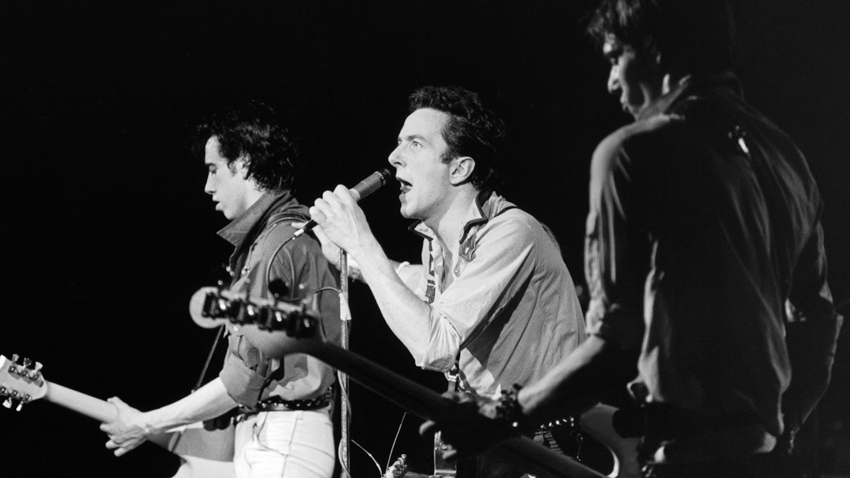
On 23 March 2003, Tom Morello stood before a couple of hundred inside New York's Waldorf-Astoria for what he calls "one of the most nerve-racking experiences of my whole life." The guitarist had faced far larger crowds before - as a member of Rage Against The Machine, he was already a pro at rocking arenas and even stadiums - but his appearance at the Rock And Roll Hall Of Fame that night was a solo flight, and he was there to pay tribute to and induct his heroes, The Clash.
"I guarantee you that no one has rewritten a speech for the Rock And Roll Hall Of Fame more times than I did," Morello says with a laugh. "There must have been about 80 drafts of that. I took it very seriously. And, of course, Joe had just passed a couple of months before, so there was that as well. I wanted to make sure that I got it right."
As a teenager in Libertyville, Illinois, much of Morello's musical sensibilities were informed by his love of heavy metal and, as he puts it, "surburban rock." All of that changed the day a classmate turned him onto The Clash's London Calling. The idea of merging unapologetic, politically charged lyrics with fabulously obstreperous rock - public service announcements with guitar - was planted in Morello's mind. It was an combustible paradigm, one that he would ignite with explosive results in Rage Against The Machine.
On the eve of the 10-year anniversary of Joe Strummer's untimely passing (he died on 22 December 2002), Morello sat down with MusicRadar to reflect on the influence The Clash had on him and to remember the late musician who helped to fuel his own musical consicousness.
Tell me about that day you discovered The Clash in high school.
"I was 16 years old and was working on the school newspaper. One day a classmate brought in a copy of London Calling. I took one look at the cover and said, 'Wow, this must be an awesome heavy metal album!' He told me that it wasn't heavy metal, but it was still great. 'With a dope cover like that, how can it not be heavy metal?' I asked. [Laughs] He assured me that it wasn't heavy metal, but it was still great.
"I had my doubts as to how any record that wasn't metal could be any good at all, but I convinced him to loan it to me so I could make a cassette and decide for myself. I listened to the album at home, and it blew my mind. [Laughs] No, it wasn't metal, and yes, it was greater than all the metal I had listened to before put together. The world changed for me with that one record."
Get the MusicRadar Newsletter
Want all the hottest music and gear news, reviews, deals, features and more, direct to your inbox? Sign up here.
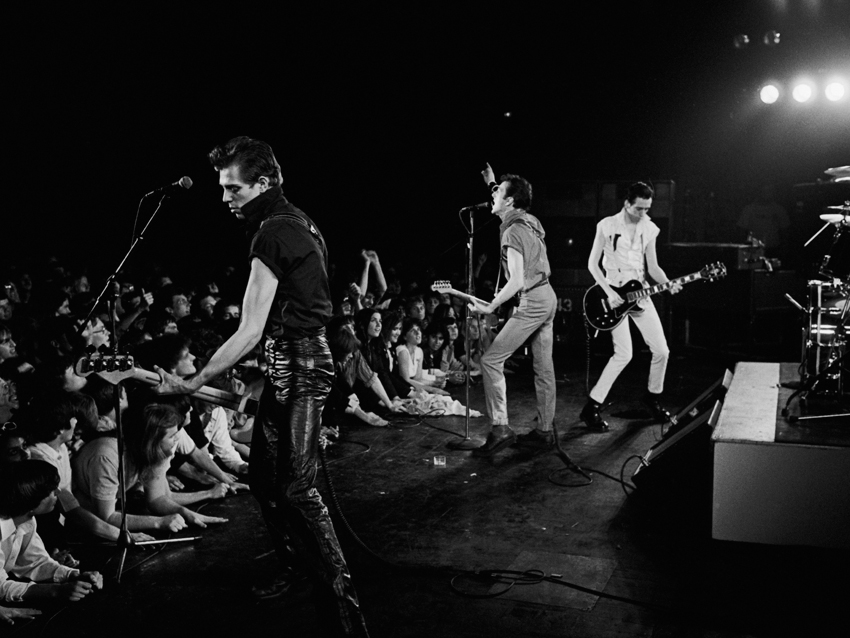
The Clash's Paul Simonon, Joe Strummer and Mick Jones on stage in 1980. © Neal Preston/CORBIS
It's a stunning moment when one band or one album can make you see things so differently.
"I listened to that cassette probably a thousand times. At that time, I was already interested in radical politics. All of the metal bands I liked were singing about dragons and wizards, groupies and limos and stuff like that. Here was a band, The Clash, with lyrics I could really relate to, who cared about the same things I cared about. They told truth to power in a way that wasn't only refreshing, it was revelatory. I thought, There's a band that believes what I do? [Laughs] It was amazing.
"I was already a fledgling guitar player, but rock still seemed somewhat unobtainable to me. The accepted way that you made it was with pillars of Marshall stacks and $10,000 Les Pauls, and you had to have your castle on a Scottish loch. I didn't have any of that [laughs]. I had my little Music Man amp on a chair in my mom's basement. But I went to see The Clash at the Aragon Ballroom in Chicago, and there was Joe Strummer, my favorite guy in rock, who had exactly the same Music Man amp on a chair on stage with him.
"That was the moment. It wasn't just a matter of 'I can do this one day,' it was more 'I am doing it. I'm doing it too. We're all doing it!' It made me feel that the music I was making, and the music I would make moving forward, really mattered."
How much of a benchmark were The Clash for Rage Against The Machine - the idea that you could marry music with a message?
"They're two links in a chain - MC5 and Public Enemy are crucial links as well. But The Clash, being my favorite band of all time, were certainly influential to me, and then when we as a band began marrying political message to roundhouse haymaker hits, it was definitely in the tradition of The Clash."
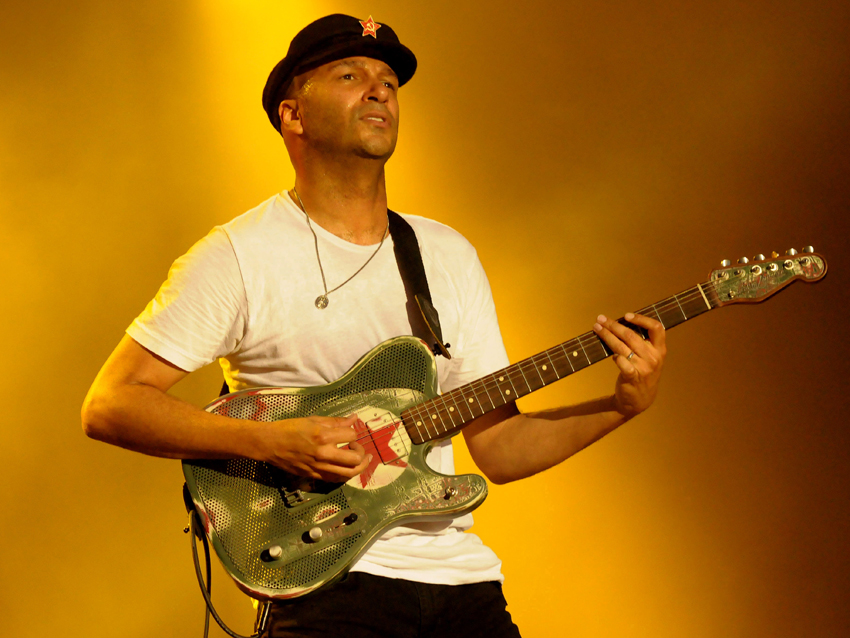
Morello on stage during a Rage Against The Machine concert, London, 2010. © David Atlas-Maayan Zach ./Retna Ltd./Corbis
The Clash embraced a lot of musical styles - especially on Sandinista! Did they push you to check out other genres you might not normally have?
"It wasn't that I sought out reggae records post-Clash, but they certainly expanded my palette. They explored a lot of different genres, but it always sounded like The Clash. And that's key - unlike other bands where it's like, 'Here's our reggae song, here's our metal song,' and so on. That just speaks to the creative vision and talents of those guys in the band. To me, Sandinista! sounds like a Clash album, as opposed to an amalgam of styles.
"Every one of their records demonstrates to me that genre doesn't matter as much as intent and innate talent. Whether it's Woody Guthrie with his Americana or Bob Marley with his reggae or The Clash - they could have come from anywhere and been great. They just so happened to have been steeped in the particular music of their time and place, but their innate talent would have enabled them to connect on a global scale wherever they were from."
The partnership of Joe Strummer and Mick Jones is an interesting one. Like all great songwriting teams, they complemented each other beautifully.
"Oh, certainly, but I wouldn't limit it to those two. The classic lineup of The Clash had four very necessary people. I'm sure you've seen the video where Joe Strummer gives the best wisdom ever to people in bands who might be thinking of breaking up. To him, the second they kicked out their heroin addict drummer, they never played another good show.
"When a band is great, it's only about chemistry. So I wouldn't say it's all about Jones and Strummer, a historically heroic songwriting team - it's also about the contributions of Paul and Topper. The band never could have sounded like it did without Topper's limitless ability on the drums to allow them to follow their muse into different genres, along with the artistic vision of Paul with regards to the band's look and his insistence on reggae being a vital part of their original rebel rock music."
As powerfully loud and direct as the band's subject matter could be, do you think it sometimes sailed over people's heads?
"The band had a lot going for them in addition to their political message. I think that could be said for Public Enemy, Rage Against The Machine, System Of A Down or some others. There are other elements that cast the nets wide and draw an audience, and then that audience is exposed to a set of ideas that they didn't get from other bands of the era.
"Yes, the fans of Should I Stay Or Should I Go - and I count myself one [laughs] - might not have been attuned to the class-war subtleties of The Equalizer, but that's OK, because a lot of people got some wind in their sails, and I put myself at the top of the list, from the political content of their songs.
"I had an opportunity to speak with Mick Jones about this, and he told me that they always very explicitly eschewed linking themselves to political organizations. Every left-leaning political organization on earth found them as their champion, of course, but the band was, as Joe says in one of the videos, 'trying to grope in a socialist way towards a future that's less grim.' They were a rock band, first and foremost. They talked about music and smoke a lot of weed and chased girls [laughs] - you know, in some ways, they had the mantle forced upon them."
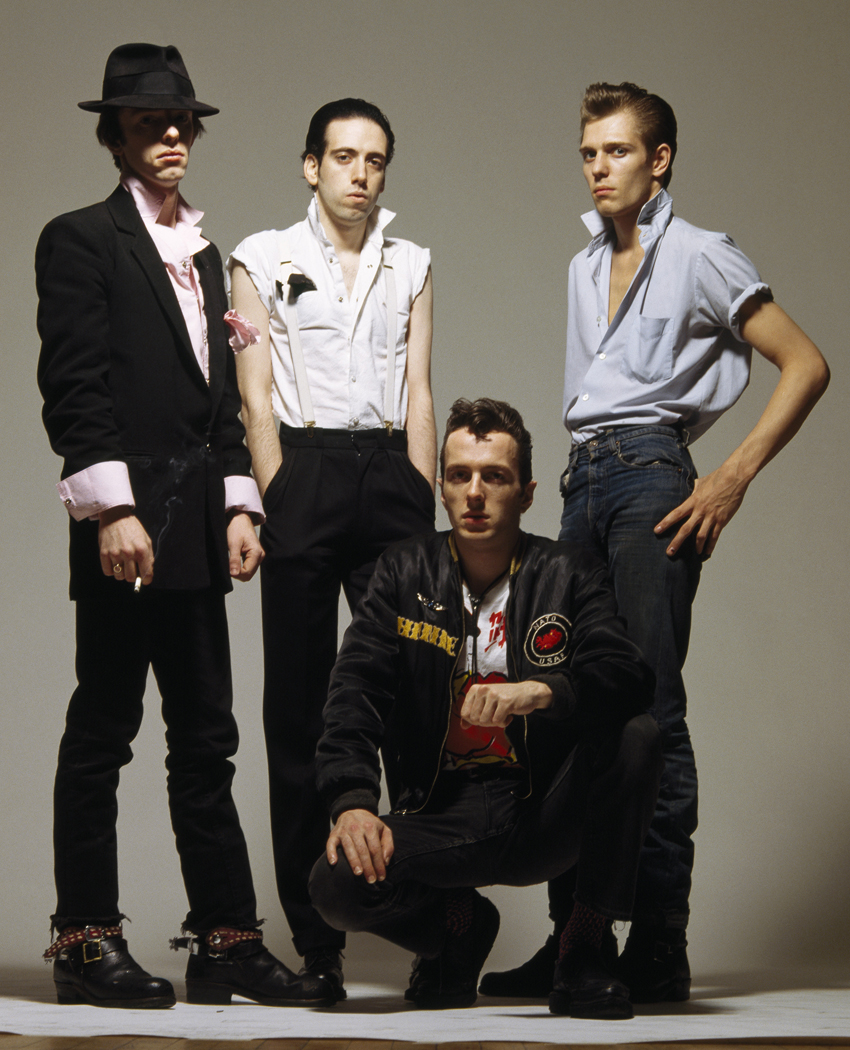
The Clash in 1982. (from left) Topper Headon, Jones, Strummer, Simonon. © Mark Hanauer/Sygma/Corbis
Beyond the music, there was also The Clash's image. I think everybody can agree on the fact that they looked incredibly cool.
"Oh, absolutely. How they built a bridge to me was very different from a lot of the West Coast punk or bands like Fugazi. These guys looked like rock stars. They had things in common with Elvis and KISS, but the message was completely different - who they were as people was different. It was like a fifth column. When I got into The Clash, I was a fan of suburban rock music. They were on Epic Records. If they were on Dischord, I never would've found them."
What are your thoughts on Joe Strummer's post-Clash work? Did you follow what he was doing?
"My thoughts on Joe Strummer… There's never been a musician who wore his heart on his sleeve like Joe Strummer. He walked it and talked it. That came through in his entire catalogue of music, Clash and moving forward.
"I had the good fortune to see him a couple of times with the Mescaleros, and I even got to play with him on a song on the South Park soundtrack. The song is called It's A Rockin' World, which may not be the highlight of my guitar playing career. But it was awesome to spend a day in the studio with him. And then, in what may be the highlight of my career, I played guitar on the Johnny Cash/Joe Strummer version of Bob Marley's Redemption Song."
That's right. That was terrific.
"So you've got my three favorite artists of all time, and somehow Rick Rubin snuck me on the track. [Laughs] I'm very grateful for that. You know, I, like everybody else, was hoping for The Clash reunion. And while I understand their reticence, it would have been really great to see that again.
"I ran into Joe a few times, and I have to say that the one regret that I do have is that I was never able to consider him a peer. I wish that I had a little more chutzpah and insisted that we work together. There were those two opportunities, but it would have been great if there were more."
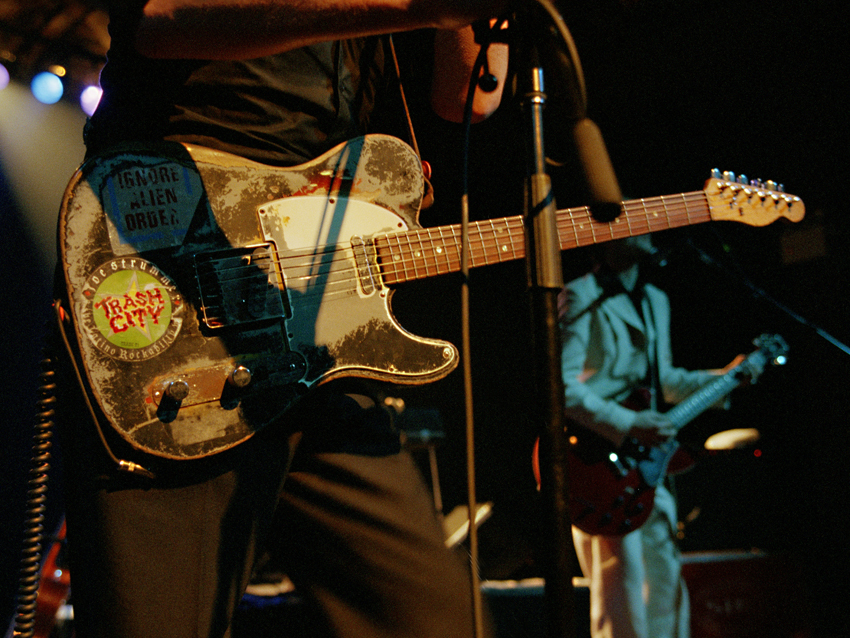
The 'Ignore Alien Orders' Telecaster strapped to its owner, Joe Strummer. © Scott Houston/Corbis
It's nice to hear that you liked Joe. Sometimes when you meet one of your heroes, you're let down.
"Joe was great. He was a character, man! [Laughs] The first time I met him was at the South Park thing. I went to the studio, and he was already there talking to some people. I kind of sat there like a disciple. He started telling us this amusing story about how he used to carry his entire record collection with him on tour. He had a lot of records, so it was a real hassle - we're talking trunks of vinyl. So finally, after years, he decided that he wanted to travel lighter, and he boiled his entire collection down to one side of a 60-minute cassette.
"We all sat rapt as he put the cassette in a boombox. He took a slug of wine, hit 'play,' and then he kind of swayed with his eyes closed to the music. We were all like, 'What is this?' It was only one group, some obscure Tex-Mex band, and it was 24 minutes of nothing but them. That was the only thing he traveled with.
"Another funny thing: At the time, I was driving a muscle car, like a '71 Dodge Demon. We went outside, and when Joe saw that car, he ran over to it, got in and started crawling around inside, checking out the floor mats and everything. I thought, Joe Strummer is crawling around the front seat of my car [laughs] after telling this sort of crazy story - there is no crystal ball that I could've looked in at the Aragon Ballroom to imagine this scenario unfolding.
"The highlight of that day took place while Joe went to do some writing, which he actually did in the car. So while he was busy, I took the opportunity to go into the studio and put on the guitar. You know which one I'm talking about - the 'Ignore Alien Orders' Telecaster. It's the one.
"So I'm wearing it, feeling it, testing the weight, the whole thing. He walked back in, and he was very happy to have me try on his guitar. There was a setlist still taped to it. He didn't remember when it was from, but it looked like it was from an awesome Clash show. It had 30 of your favorite Clash songs all lined up."
Joe is a freelance journalist who has, over the past few decades, interviewed hundreds of guitarists for Guitar World, Guitar Player, MusicRadar and Classic Rock. He is also a former editor of Guitar World, contributing writer for Guitar Aficionado and VP of A&R for Island Records. He’s an enthusiastic guitarist, but he’s nowhere near the likes of the people he interviews. Surprisingly, his skills are more suited to the drums. If you need a drummer for your Beatles tribute band, look him up.










